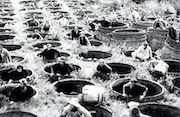|
Back to the main topic. High level nerds with a zombie fetish write some stuff. http://truth-out.org/opinion/item/19800 quote:In other words, poverty is as omnipresent for the poor as the threat of zombies is for the characters in The Walking Dead. Just as the threat of zombies and reanimation into zombies weigh on the characters’ minds and drive their actions 24 hours a day and every day of their lives, poverty too dictates who poor people are and what they do. quote:Dystopian politics has become mainstream politics as the practice of disposability has intensified and more and more individuals and groups are now considered excess, consigned to "zones of abandonment," surveillance and incarceration. The expansive politics of disposability can be seen in the rising numbers of homeless, the growing army of debt-ridden students whose existing and future prospects remain bleak, those lacking basic necessities amid widening income disparities, the surveillance of immigrants, the school-to-prison pipeline and the widespread destruction of the middle class by new forms of debt servitude.(7) Citizens, as Gilles Deleuze foresaw(8), are now reduced to data, consumers and commodities and, as such, inhabit identities in which they increasingly become unknowables, with no human rights and with no one accountable for their condition. It rambles on quite a bit though.
|
|
|
|

|
| # ? Apr 26, 2024 12:06 |
|
down with slavery posted:Maybe you missed it but the Deepwater horizon spill happened in 2010, which is after Obama had appointed the head of the MMS (body that regulated offshore drilling before they hosed it up so bad they had to change the name) and well into his presidency. Which had nothing to do with the disaster happening. Again, this has nothing to do with the disaster happening. You don't know what you're talking about, once again. You're just madly waving your hands to try to defend a horrible attempted example of your original contention. Nintendo Kid fucked around with this message at 21:30 on Jun 1, 2014 |
|
|
|
Nintendo Kid posted:Which had nothing to do with the disaster happening. Please please please shut the gently caress up unless you have something to say about Capital in the Twenty-First Century, the book written by Thomas Piketty that is the subject of this thread.
|
|
|
|
So I'm about 250 pages through this book. There is a lot of stuff there but one thing that I found extremely distracting was his reliance on depictions of economics in novels. He supposedly has all this sweet and original data which took years to collect but he spends a not insignificant amount of time relating his arguments back to loving Jane Austen and whomever else. Why?
|
|
|
|
Paper With Lines posted:So I'm about 250 pages through this book. There is a lot of stuff there but one thing that I found extremely distracting was his reliance on depictions of economics in novels. He supposedly has all this sweet and original data which took years to collect but he spends a not insignificant amount of time relating his arguments back to loving Jane Austen and whomever else. Why? It's just a framing device. A lot of the times he mentions it he expounds on a point using his data, then says something like "authors like Austen and Balzac took xyz for granted" or talks about how much it factored into their work. I guess to try to reach a non-academic audience, though I'm not sure if this was supposed to be a popular book or not.
|
|
|
|
I thought someone said earlier in the thread or in one of the links that it was to show a reflection of the 'conventional wisdom' of the discussed time period, namely that being wealthy throughout the ages has been a matter of inheritance, and that literature of the time took it as a given esp. with the culture built around wealth immobility.
|
|
|
|
Paper With Lines posted:So I'm about 250 pages through this book. There is a lot of stuff there but one thing that I found extremely distracting was his reliance on depictions of economics in novels. He supposedly has all this sweet and original data which took years to collect but he spends a not insignificant amount of time relating his arguments back to loving Jane Austen and whomever else. Why? He is trying to connect to nonacademics, for the most part the book has a fairly light touch.
|
|
|
|
Ardennes posted:He is trying to connect to nonacademics, for the most part the book has a fairly light touch. I wonder if he's trying to do some of this in publicity as well, at least in the way he is trying to distance himself from (obvious) comparisons to Marx. I love how one of his criticisms of Marx is that, "in the books of Marx there’s no data" which is a hilarious thing to say.
|
|
|
|
Danger posted:I wonder if he's trying to do some of this in publicity as well, at least in the way he is trying to distance himself from (obvious) comparisons to Marx. I love how one of his criticisms of Marx is that, "in the books of Marx there’s no data" which is a hilarious thing to say. That's also his criticism of his own work and, seemingly, American economics as well.
|
|
|
|
Paper With Lines posted:That's also his criticism of his own work and, seemingly, American economics as well. Hmm... Hand all NSA archive data to him, sack every fucker working there and declare Piketty "Economic Data Make it happen Obama! 
|
|
|
|

|
| # ? Apr 26, 2024 12:06 |
|
Not to thread necro, but it seems like this book is still reverberating among academics. Here is a round table with some big names in the Guardian.
|
|
|












